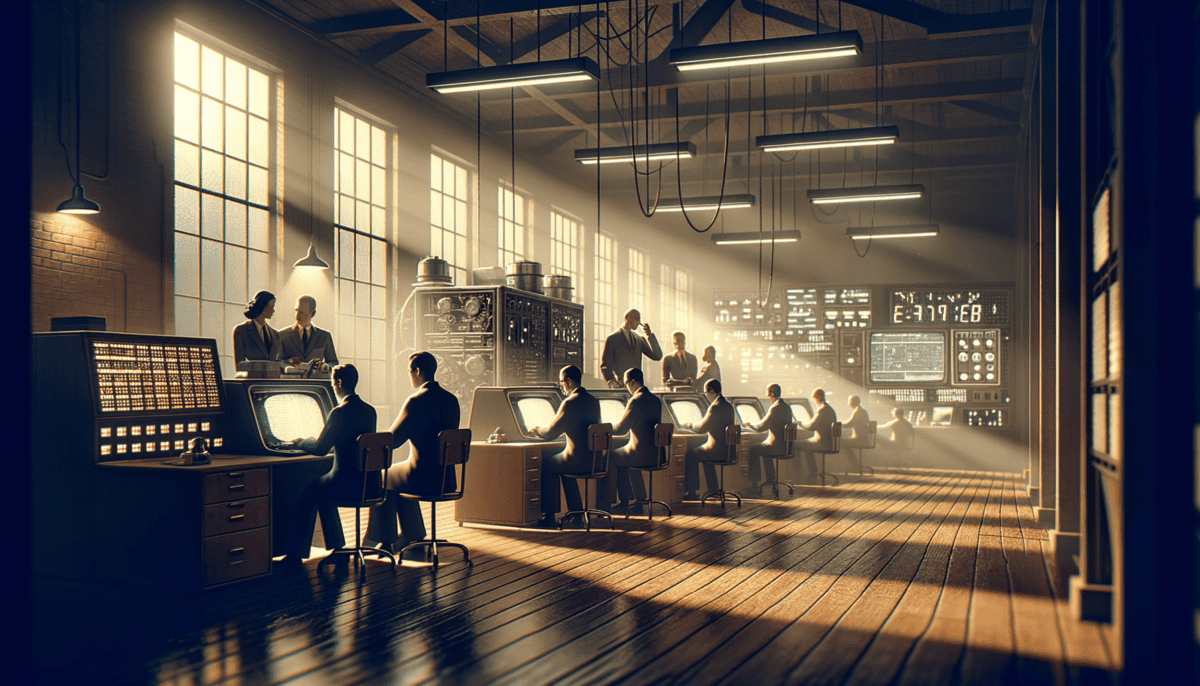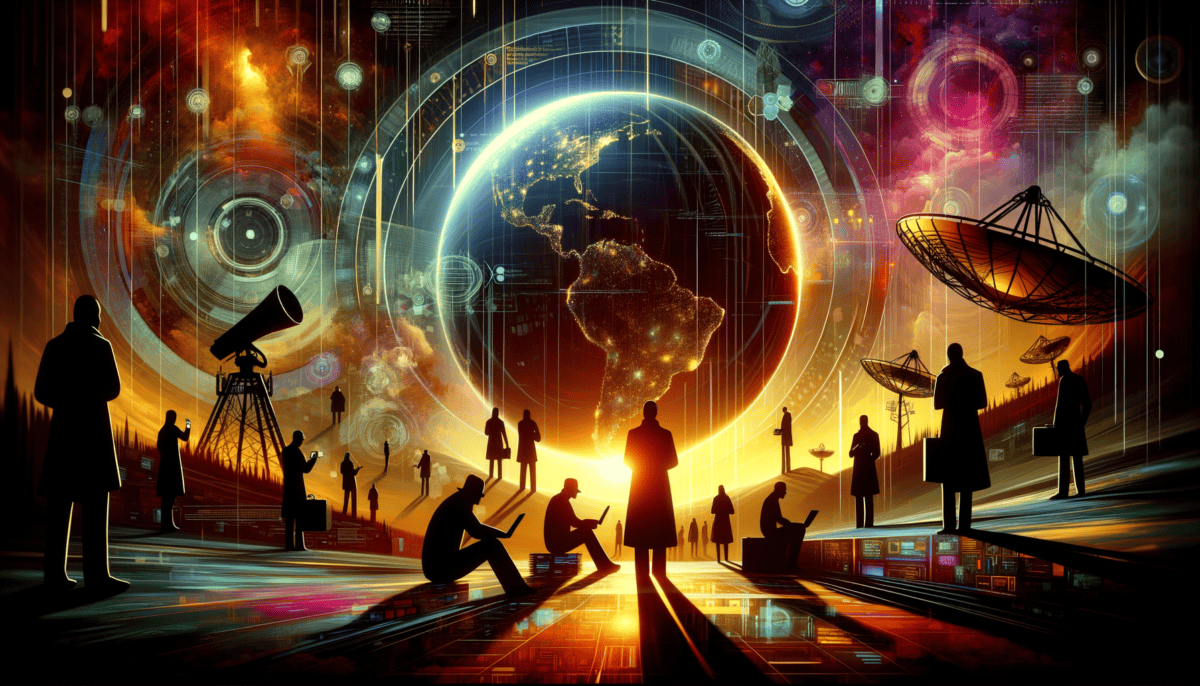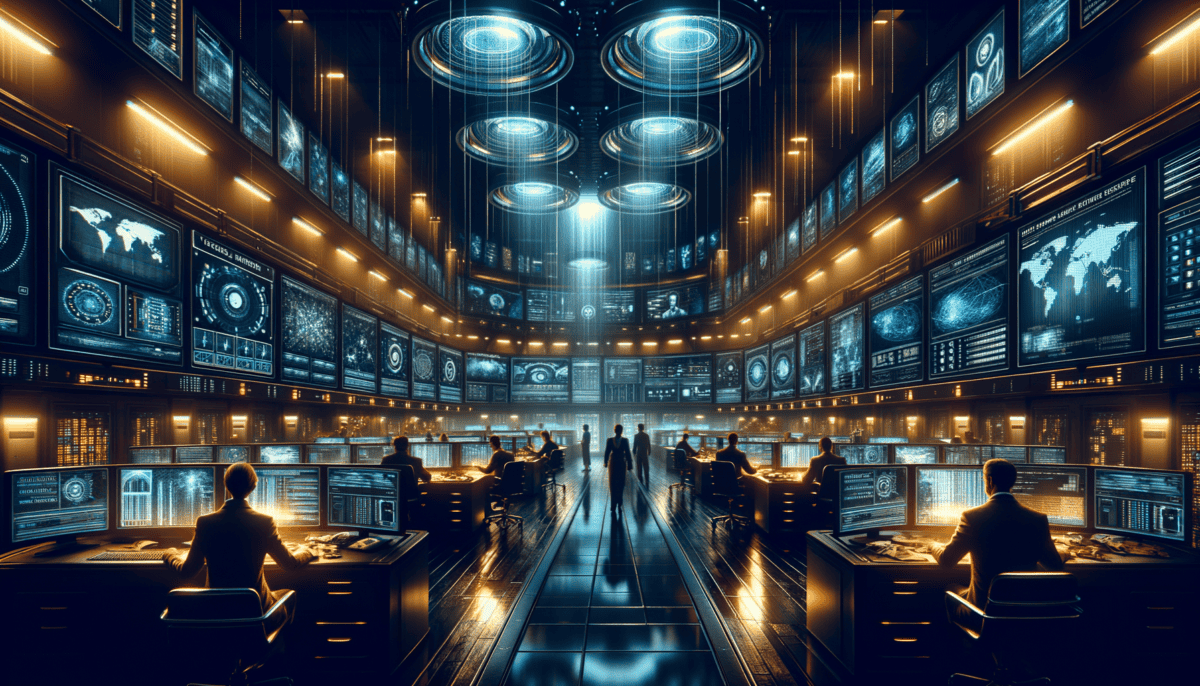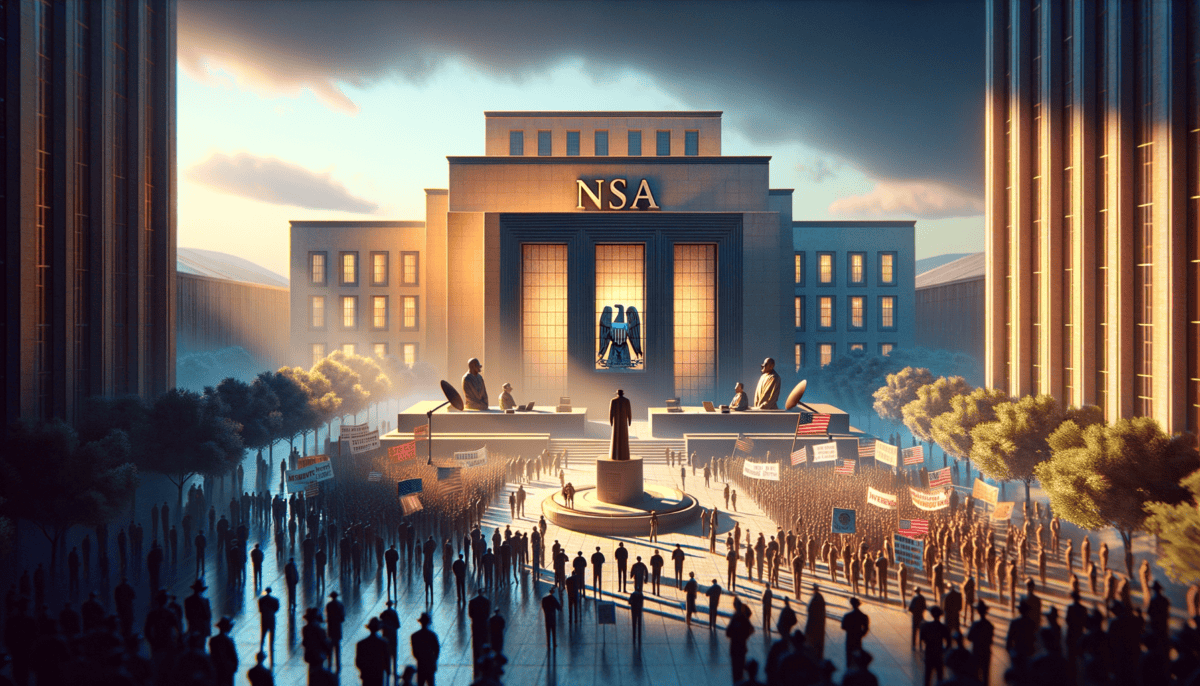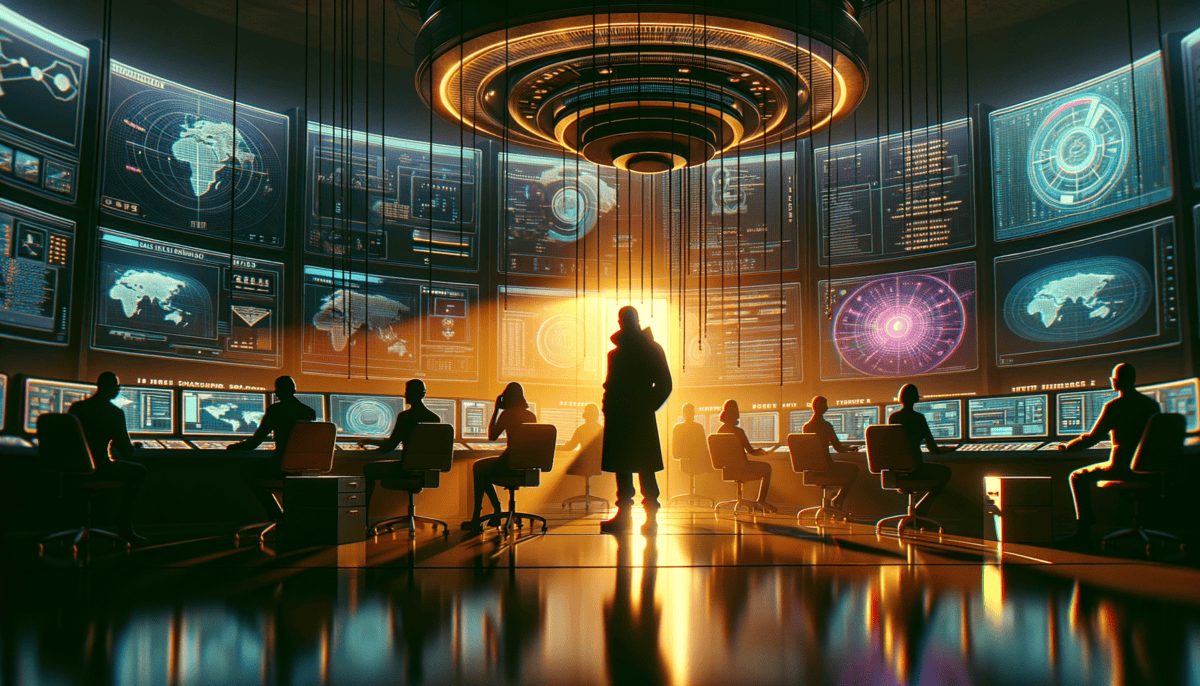The Code Breakers’ Origins
Sarah looked up at the towering brick building where her grandmother had worked during World War II. The old windows reflected the morning sun as she clutched a worn leather diary in her hands.
"Tell me again about your secret job, Grandma Rose," Sarah whispered, opening the diary's first page.
Rose had been a college student studying mathematics when the war began. The military needed smart people who could solve puzzles and break secret messages. They called these people "code breakers."
"Your grandmother was special," Sarah's mom explained. "She worked with a group called the Signal Intelligence Service. They figured out the secret messages that enemy countries were sending."
In a small room filled with clicking machines, Rose and other young women worked day and night. They looked for patterns in jumbled letters that made no sense. It was like solving the world's hardest word puzzle, but the answers could save lives.
The Birth of American Code Breaking
The code breakers had amazing success. They cracked Japanese messages that helped win battles in the Pacific Ocean. They decoded German secrets that helped defeat Hitler's army in Europe.
"But how did they do it?" Sarah asked, flipping through more diary pages.
Her mom smiled. "They used early computers – huge machines that filled entire rooms! And they created special dictionaries of codes. Every solved puzzle helped them crack the next one."
• Used mathematics and patterns
• Worked in teams around the clock
• Built special machines to help solve codes
• Kept everything super secret
After the war ended, the code breakers didn't stop. The world was changing fast. New machines could send messages through the air using radio waves. Countries needed ways to keep their messages safe – and to read other countries' secret messages.
"Your grandmother helped build something very important," her mom said. "She helped create what would become the National Security Agency – the NSA."
Sarah traced her finger over a faded photograph showing Rose standing with her fellow code breakers. They were smiling, but their eyes looked tired from long hours of work.
“We weren’t just breaking codes,” Rose had written. “We were protecting our country. Every message we decoded might save American lives. That’s what kept us going, hour after hour, day after day.”
The work of these early code breakers laid the foundation for modern intelligence gathering. Their simple tools – pencils, paper, and basic machines – would evolve into powerful computers and complex algorithms.
"Did Grandma Rose ever imagine how big it would become?" Sarah wondered aloud, looking at the NSA building again.
"I don't think anyone could have predicted it," her mom replied. "But your grandmother knew they were part of something important. Something that would help protect people for generations to come."
The sun climbed higher in the sky as Sarah closed the diary. The old brick building seemed different now – not just a place where her grandmother had worked, but a symbol of how ordinary people doing extraordinary things could change the course of history.
Their legacy lived on in the modern NSA, where new generations of code breakers faced fresh challenges in a digital world. But it all started with people like Rose, armed with sharp minds and determination, working to break the codes that could win a war.
Birth of a Digital Sentinel
The year was 1952, and a new kind of guardian was born. President Harry Truman signed a special paper that created the National Security Agency. ️
Colonel James Anderson sat at his desk, looking at the brand new NSA badge in his hands. The morning sun streamed through his office window at Arlington Hall Station.
The First Big Challenge
The NSA faced a big problem right away. The Soviet Union was sending more secret messages than ever before. The old ways of breaking codes weren’t fast enough anymore. They needed something new – something faster.
“What we need,” said Dr. Sarah Mitchell, one of the agency’s top scientists, “is a thinking machine.”
That “thinking machine” would become one of the world’s first computers. They called it HARVEST. It was as big as a school bus and made funny whirring sounds all day long. ️
“The HARVEST computer could do in minutes what would take a hundred code breakers a whole week!” – Dr. Mitchell’s notes
Cold War Secrets
The Cold War made the NSA’s job super important. The agency had to listen for radio messages from all over the world. They built special listening stations with giant satellite dishes that looked like big ears pointed at the sky.
• Special radio receivers
• Giant computers
• Code-breaking machines
• Secret listening stations
Young mathematicians and scientists came to work at the NSA. They learned new skills like:
• How to make secret codes that no one could break
• Ways to listen to radio signals from far away
• How to use new computers to solve puzzles
Growing Stronger
By 1960, the NSA had grown bigger than anyone expected. They moved to a new home at Fort Meade in Maryland. The building was huge – like a small city!
“Remember when we started with just a few rooms?” Colonel Anderson asked at the opening ceremony. “Now look at us.”
The new building had special features:
• Super strong walls to keep secrets safe
• The newest computers money could buy
• Special rooms where no radio signals could get in or out
Learning New Skills
The NSA needed smart people who could do many different jobs. They started special schools to teach people about:
Making and breaking codes
Understanding different languages ️
Working with new computers
Keeping secrets safe
“Every day we learn something new,” wrote one young code breaker. “The world is changing fast, and we have to change with it.”
A New Kind of Guardian
By the end of the 1960s, the NSA had become America’s digital guardian. They were ready to face new challenges in a changing world.
Colonel Anderson, now getting ready to retire, looked out his window one last time. The parking lot was full of cars belonging to thousands of code breakers, computer experts, and language specialists.
The sun set behind the NSA building, its windows glowing like a thousand tiny stars. Inside, the machines hummed, the computers clicked, and the work of protecting America went on.
The little agency that started with just a few code breakers had grown into something much bigger. It was ready to face whatever challenges the future might bring.
The Silent Guardians
Sarah Martinez adjusted her headphones, listening carefully to the crackle of radio signals. It was 1968, and something big was happening.
Hidden Heroes
Deep inside the NSA building, teams of people worked day and night. They never got medals or had their names in the news. But they were real heroes. ♂️
Tom Chen was one of these heroes. He sat at his desk, looking at strange patterns on his computer screen. His job was to spot hidden messages that bad guys might send.
“Sometimes the smallest clue can help save lives,” Tom would say. “We have to pay attention to everything.”
New Ways to Listen
The NSA kept making better tools to hear messages from far away. They built tiny machines that could pick up whispers from across the ocean.
Dr. Lisa Wong led the team that made these new tools. “It’s like giving our ears super powers,” she explained to new workers. “We can hear things that regular radios can’t.”
• Super-small listening devices
• Smart antenna systems
• Special recording machines
• Code-breaking computers
Doing the Right Thing
Sometimes the NSA workers had to make hard choices. They wanted to keep America safe, but they also had to protect people’s privacy.
“We have special rules,” explained Director Thompson to new workers. “We only listen to the bad guys, never to regular American people.”
Every worker had to promise to follow these rules. They even signed a special paper about it.
Big Moments
One day in 1969, Sarah picked up a message that saved many lives. Bad guys were planning to hurt people, but thanks to her quick thinking, they were stopped.
“Great work,” her boss said. “But remember…”
“I know,” Sarah smiled. “We can’t tell anyone it was us.”
Working Together
The NSA didn’t work alone. They helped other groups keep America safe too:
• They shared information with the FBI
• They helped protect army messages
• They worked with friendly countries
• They warned about dangers coming to America ⚠️
“We’re like a big family,” Tom said. “Everyone has an important job to do.”
Always Learning
The world kept changing, and the NSA had to change too. They learned about new kinds of radio signals, better ways to make codes, and faster computers.
Dr. Wong spent lots of time teaching young people about new technology. “Today’s students will be tomorrow’s guardians,” she said with pride.
Looking Forward
As the 1970s began, the Silent Guardians of the NSA kept working hard. New challenges were coming – bigger computers, faster messages, and cleverer bad guys.
Sarah looked at the young faces joining her team. “Ready for another day of protecting America?” she asked with a smile.
The new workers nodded eagerly. They were proud to be part of this special team, even if nobody would ever know their names.
Inside the quiet halls of the NSA, the work went on. Messages came in, codes were broken, and America stayed safe, thanks to these silent heroes.
The Cyber Battlefield
The year was 1995, and James Cooper stared at his computer screen in amazement. Something new was happening – the internet was changing everything!
A New Kind of War
The internet made things exciting but also scary. Bad guys could now attack America through computers. They could steal secrets or break important machines with just a few clicks. ️
“It’s like playing chess,” explained Maria Rodriguez, a young computer expert. “We have to think many moves ahead to stop the attacks.”
Digital Defenders
The NSA built a special team called the Cyber Command. These computer experts worked day and night to protect America’s important computers.
“We’re like digital firefighters,” smiled Kevin Chen, Maria’s teammate. “Instead of putting out fires, we stop computer attacks.”
• Power plants
• Banks
• Hospitals
• Army computers
• Government secrets
The Big Attack
In 2003, something big happened. Bad guys tried to break into lots of important American computers at once!
Maria spotted it first. “Look at these weird patterns!” she called out. The team worked for three days straight to stop the attack.
“You saved us,” their boss said afterward. But like always, their names stayed secret.
Super Smart Software
The NSA made special computer programs to catch bad guys. These programs could spot danger faster than any human.
“It’s like having a super-smart guard dog,” Kevin explained to visitors. “It watches everything and barks when it sees something wrong.”
Working with Friends
The NSA taught other groups how to stay safe online:
They helped big companies protect their computers
They warned about new computer viruses
They shared safety tips with schools
They worked with other countries to catch cyber criminals
The Biggest Challenge
Bad guys kept getting smarter. They made tricky computer viruses and found new ways to hide their attacks.
“Every day is different,” Maria said. “That’s what makes our job exciting – and important.”
Teaching New Defenders
The NSA started special schools to teach young people about cyber security. They even made computer games to help kids learn!
Always Watching
By 2010, the internet was everywhere. More people had computers and phones than ever before. The NSA had to work harder to keep everyone safe.
But Maria and her team were ready. With their smart programs, strong teamwork, and quick thinking, they protected America from digital dangers.
Every night before going home, Kevin would check his screens one last time. “All quiet on the cyber front,” he’d say with a smile. “For now.”
The cyber battlefield never sleeps, and neither do its guardians. As computers get smarter, the NSA keeps finding new ways to protect America in the digital age. ️
Secrets and Tough Choices
The morning sun peeked through the windows of the NSA building in 2013. Sarah Mitchell walked to her desk, not knowing this day would change everything.
The Big Reveal
A man named Edward Snowden had shared secret information about how the NSA watched people’s phones and computers. Everyone was talking about it!
“We need to explain why we do what we do,” said Director Tom Rogers. “People are scared and confused.”
Two Important Things
The NSA had a tricky job. They needed to:
1. Keep America safe from bad guys ️
2. Protect people’s privacy
Sometimes these two things didn’t work well together.
Making Things Better
Sarah and her team worked hard to fix things. They made new rules about watching people’s information:
• Ask permission first
• Only watch bad guys
• Keep better records
• Tell people more about their work
• Have others check their work
Talking to People
The NSA started telling people more about what they did. They visited schools and made fun videos to explain their work.
“We’re the good guys,” Sarah told a group of kids. “We just want to keep everyone safe.”
New Technology, New Problems
As phones and computers got fancier, the NSA had to be extra careful. Bad guys used these new tools too!
“It’s like playing hide and seek,” explained Mike, a computer expert. “But the hiding spots keep changing.”
Working Together
The NSA asked for help from big computer companies. They worked together to make better ways to catch bad guys while protecting normal people’s information.
“We can do both,” Sarah said. “Keep secrets AND protect privacy.”
Learning and Growing
Every mistake taught them something new. The NSA got better at:
Following the rules
Being honest with people ️
Finding sneaky bad guys
Protecting private information
Looking Forward
By 2020, things were different at the NSA. They still watched for bad guys, but they were more careful about it.
Some people were still worried about privacy. But others felt safer knowing the NSA was watching out for them.
Sarah looked at her computer screen. She knew her job wasn’t easy, but it was important. The NSA would keep working to find the right balance between keeping secrets and being open with people.
As the sun set, she smiled. Tomorrow would bring new challenges, but they were ready.
The Future of Digital Defense
Sarah Mitchell stood at the front of a bright classroom in 2023. She smiled at the young faces looking up at her.
Training Tomorrow’s Heroes
The NSA now had special programs to teach kids about computers and keeping information safe. They called it “Cyber Cubs”
“These kids are amazing,” Sarah told her boss. “They understand computers better than I did at their age!”
New Tools for New Times
The NSA was using cool new technology to protect America:
• Smart computers that learn by themselves
• Super-fast code breakers
• Special sensors that watch for danger
• Friendly robots that help find problems
• Safe ways to talk to other countries
Working with Friends
The NSA didn’t work alone anymore. They made friends with other countries to fight bad guys together.
“Bad guys don’t care about borders,” Mike explained to his team. “So we need friends everywhere!”
Space: The New Frontier
The NSA was even looking to space! They watched satellites and helped keep space safe for everyone.
“Space is like a big ocean,” Sarah told her students. “We need to protect the ships that sail there too!”
Helping Everyone Stay Safe
The NSA shared what they learned about staying safe online:
✨ Use strong passwords
✨ Be careful what you click
✨ Keep your computer updated
✨ Tell grown-ups about weird messages
The Big Challenge
New kinds of computers called “quantum computers” were coming. They could break old codes easily!
“We need to make better codes,” Mike said. “Codes that even these super-powerful computers can’t break.”
Protecting the Future
Sarah looked at her phone. A message popped up about a new kind of computer virus. The work never stopped!
A New Chapter
As Sarah walked through the NSA halls one last time that day, she saw old pictures next to new computer screens. The NSA had come so far from its code-breaking days!
The future would bring new challenges: smart robots, space problems, and things nobody had thought of yet. But the NSA was ready.
“We’ll always need people who want to protect others,” Sarah told her class. “That’s what the NSA is all about.”
Outside, a new group of cyber defenders was graduating from training. Sarah watched them walk by, proud and ready to protect America’s digital future.
From breaking codes in World War II to protecting space satellites, the NSA had grown and changed. But its mission stayed the same: keeping America safe in a world full of new adventures and challenges.
The sun set on another day at the NSA, but somewhere, someone was always watching, protecting, and preparing for tomorrow. The story of America’s digital defenders would never end – it was just beginning! ⭐


